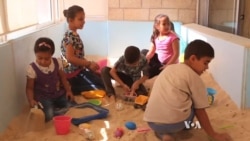More than half of the 3.3 million people displaced by Syria's civil war are children. In Jordan alone, more than 300,000 children are starting new lives with limited access to education, health, and attention to their psychological well-being.
The focus of international donors is on immediate and tangible needs such as shelter, food and basic health care. But the psychological harm can also have catastrophic consequences.
A handful of organizations are doing what they can to keep an entire generation from being wasted. Some Syrian refugee children living in Amman are benefiting from organizations helping them recover from trauma.
It’s an unusually quiet morning at Malki-Salaam Children’s Center in Amman. It’s a national holiday, but nine-year-old Tallal and his sister Meryem would rather be here than where they live -- in nearby Al Hussain refugee camp.
“I want to return to Syria. I don’t like living in Jordan. Every kid tries to beat me. I wouldn’t be doing anything. He’ll pass and start asking me what my mom’s name is and will start beating me,” he said.
Everyone here has been uprooted from what was normal and familiar -- from school and teachers; from friends and family. More importantly, they’ve all witnessed the horror of war.
“We moved to Al Reef Damascus. That’s where the battle happened. We went to the basement. We hid in it. After it stopped, at night, we went to the house. We went around the next day and found everything ruined. Everything was destroyed," he recalled. "The remaining pillars were full of bullets. And the walls filled the ground.”
Tallal and Meryem have been coming to the center for two months. They are part of the three-month-long rehabilitation program run by Dr. Amer Shafik and his colleagues.
“I feel we have a really big problem with the children coming from Syria. [The] Assad regime destroyed everything in Syria. Destroyed the body, the emotions, everything,” he said.
Every three months Shafik interviews and selects 20 Syrian children from the Al Hussain refugee camp to participate in the program. Most are suffering from post-traumatic stress disorder -- manifested in bedwetting, nightmares, aggression and fear of social contact. Tallal was one of them only a couple of months ago.
“I asked him about the nightmares, he said everything stop…I have good dreams about Syria. About coming back to Syria. Going to the gardens and his home. And to the mosque,” Shafik said.
Playing at the center is as close as it gets to returning to Syria. Normally the schedule is packed with various forms of therapy. But playing and singing is always a part of it. It’s all about finding the joy of being a child again.
But the rehabilitation does not end here. On this day, Shafik, who left Syria two years ago himself, is going to visit the families.
“Every day, we talk to the parents of the children. The parents come to my clinic every week," he said. "Sometimes we make lectures for them. And talking with them. Visit them. Most of the parents told me that urinate stop, night dreams stop."
Shafik and his colleagues stay in close contact with the more than 200 program alumni. One woman left Syria when her husband was killed in front of her nine children. At the U.N. refugee agency a room and a kitchen are provided. Three of her children were part of the Salaam program, and she says she has seen a big improvement in their behavior.
“Their mother said when they came back from the center loving and playing and singing. They became very very good. So she said please, we need them to come back to the center,” Shafik said.
But he can not promise that, because resources and space at the privately-funded center are limited. He wants to give as many as possible the opportunity for treatment.
“I told everybody here in Syrian people, we have to be strong. Assad regime wanted to destroy everything inside ourselves," Shafik said. "Really, I come back to my home. I play with my family, my children, as nothing. This is my job."
The scars of trauma run deep and wide, though. So it's perhaps unrealistic to think three months of therapy can permanently erase the effects of horrific experiences. But, Shafik and the Malki-Salaam center try to bring back a sense of normalcy, joy and perhaps belonging, to a handful of children at a time.





